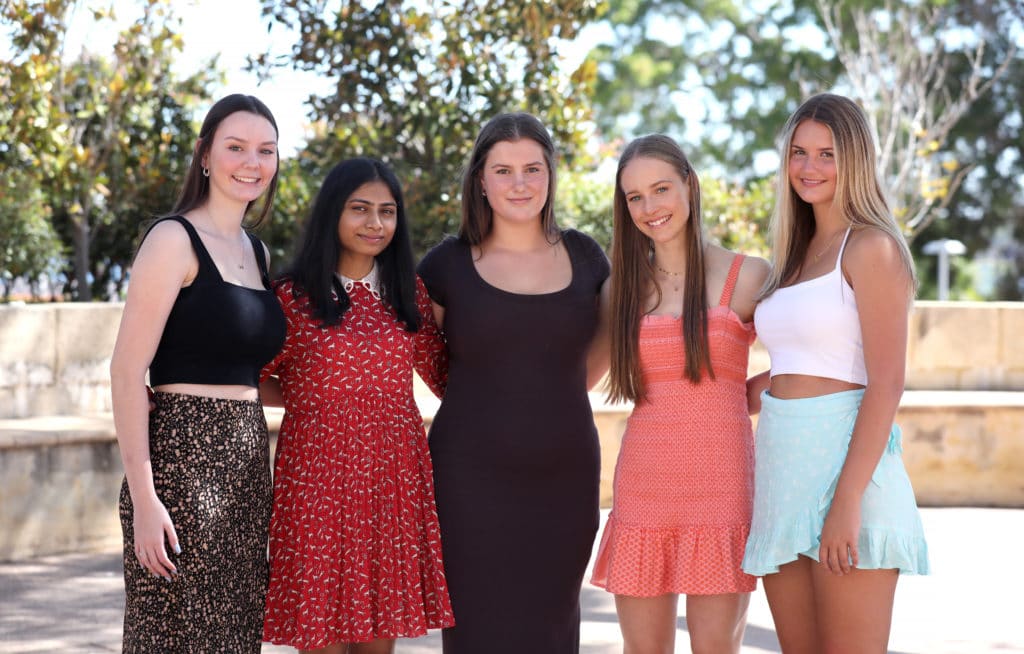Super Six to Study Medicine

Science, methodology, practicality, patience, personality, and empathy….
These are the words we often use to encapsulate the subject of medicine.
The amount of knowledge required to study medicine is one thing, but being accepted into the course can prove to be even more difficult.
Medical school acceptance rates are extremely low in Australia.
This is why the College is proud to announce that six (yes, you read that correctly) of our graduates from 2021 have been accepted into medical school across various universities in Western Australia!
Sophie Krummenacher, Hannah Potula, Sirena McDowell, Grace McCormack, Tahlia Fairhead and Shanice D’Silva, have taken the leap of faith and will be pursuing a career in medicine.
We sat down with the girls and had a chat with them about what they attribute to their success.
“Consistency in my studies is something which lead to my acceptance into medicine. In saying this though, I still think it is equally as important to maintain a healthy school-life balance. Don’t give up on the out of school activities that you enjoy, as these provide the breaks needed to stay dedicated to your studies.”, said Sophie.
Tahlia added, “For me, it was the ability to manage my time effectively. Scheduling my days and sticking to it was so vital. Routine and structure really are key.”
The girls also had plenty to say about the College, making mention of the supportive and encouraging staff, who assisted in making their ATAR journey a smooth sailing process.
Sirena explained, “Santa Maria guided me through my studies with dedicated and enthusiastic teachers. The other students at Santa Maria in my cohort were also invaluable through my Year 11 and 12 studies as talking with friends, consolidating knowledge and discussing key issues was a major key to my success.”
“The positive learning environment encouraged me to have an active approach to my learning – that is to learn from my mistakes. I will take this with me through to my university studies and everything else that I do.”, said Hannah.
For Shanice, it was the diverse array of co-curriculars, which helped develop the skills she will need to succeed in the medical field.
Shanice said, “Through these co-curriculars I developed several friendships, made a difference in the community, and dived into leadership opportunities, which gave me the confidence and belief I needed to take up medicine. A good ATAR isn’t the only thing required to gain entry, so dividing my time across co-curriculars, socialising and studying was important.”

Being fresh graduates from high school, we asked the girls what advice they would give to students who are in the process of choosing subjects and deciding where they would like to take their career.
“If you think you are capable, just give it a go! The worst that can happen is that you change to a different pathway.”, said Tahlia.
Sophie emphasised, “Pick subjects that you enjoy. If you are interested in the topics you are learning, you are more likely to want to study them. It’s awesome to feel excited by what you learn!”
And where do these girls see themselves in 10 years? Here’s what they had to say:
“Career-wise, I would like to be specialising in medicine, and as a result will probably still be studying. As part of my offer, I’m required to spend some time in rural areas too, but I hope to also find several other ways to give back to the community. I would have loved to have also done a bit of travelling and thinking about starting a family too.”, said Shanice.
Hannah added, “In 10 years, hopefully, I would have finished medical school and will be thinking about what I want to specialise in. I think that I would be career-focused, but more importantly, I would like to be working on my personal growth and using my time to benefit others in the community.”
Tahlia said, “By the time I’m 27 I hope to be (almost) a fully qualified doctor of some sort. I also hope I have had the chance to travel the world and gained many more experiences. I also would have lived overseas for a year or two; hopefully New Zealand or the US.”
We wish you the best of luck in your future studies, girls.
If we ever need a doctor or specialist in the future, we now know who to call!

Combating The Attention Span Crisis In Our Students – Jennifer Oaten
It is no secret that attention spans have been steadily declining, especially among younger generations growing up immersed in digital technology. The average person’s attention span when using a digital device has plummeted from around two and a half minutes back in 2004 to just 47 seconds on average today – a dramatic 66% decrease over the past two decades.

With Laurissa Knowles From Valley Depths to Mountain Peaks (1993)
Laurissa Knowles (1993) has had an incredible career journey so far, from Santa Maria College Teacher to Celebrant and Councillor.

Elevating Spaces: Diana Ellis’ Signature Touch & Architecture Magic
What happens when you mix a love for art, travel, nature, and creativity with construction and building? You get the essence of Diana Ellis’ career!
- Adaptability, alumni, Featured, Learning4Life, Resilience
Author: Santa Maria College
Santa Maria College is a vibrant girls school with a growing local presence and reputation. Our Mission is to educate young Mercy women who act with courage and compassion to enrich our world. Santa Maria College is located in Attadale in Western Australia, 16 km from the Perth CBD. We offer a Catholic education for girls in Years 5 – 12 and have 1300 students, including 152 boarders.






